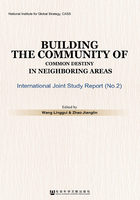
Preface and Acknowledgements
Executive Vice Chairman of Board of Directors & Secretary General, National Institute for Global
Strategy, Chinese Academy of Social Sciences
With the theme of “Building the Community of Common Destiny between China and Its Neighbors: Challenges and the Future”, the International Think Tank Forum was held from 18th to 19th November 2016, in Beijing, by the National Institute for Global Strategy (NIGS) of Chinese Academy of Social Sciences (CASS) and University of International Relations. After the event, attending experts made further explorations around the theme of the forum. This monograph is the result of these further studies and represents the phased outcome of joint study by NIGS and major foreign think tanks.
Recently while talking ideas with foreign think tank scholars, I was shocked by one of them who mentioned two facts. He said that, the world at large, especially those developed economies, have formed their impression about China from different materials and sources, 80% to 85% of which was written or reported in English by scholars from western countries. Conversely, among China's materials and sources for learning about neighboring countries, 85% to 90% of them are from the similar origin, which is quite narrow. As one think tank that Supplies products of policy studies, if we refer to homogeneous sources when producing products of policy studies, will they help us learn about other countries and serve for formulating foreign policies? Will they help us reach more consensuses and increase mutual interests? The answer is negative.The foundation of diversifi ed civilizations is the diversifi cation of thoughts and ideas, because our brain always craves for various knowledge and truths.
As for the idea “Community of Common Destiny”, it has been mentioned by President Xi in various major events and the concept of “raising Awareness about Human Beings Sharing a Community of Common Destiny” is elaborated in details. Dating back to May 2014, on the 4th Conference on Interaction and Confi dence-Building Measures in Asia, President Xi addressed that “Asia today is home to 67% of the world's population and accounts for one third of the global economy”, that “Peace and development of Asia is closely connected with the future of the mankind. Asia's stability and revival is the blessing of peace and development of the world.”, and that Asian countries should “jointly build a road for security in Asia that is shared by and win-win to all”. In March of the following year, President Xi delivered a speech titled “Towards a Community of Common Destiny and a New Future for Asia” at the opening ceremony of Boao Forum for Asia Annual Conference. During the speech, President Xi indicated that community of common destiny was the “new future for Asia” and he believed that as long as China and other Asian countries kept their goal and work together, they would bring about common prosperity.
Facing the fast changing international and regional landscapes, we must see the whole picture, follow the trend of our times and jointly build a community of common destiny, which is not all about sharing common interest, but also includes the sharing responsibility. In that sense, building a community of common destiny does not equal to establishing an institutional arrangement that transcends ethnicity and nation. By establishing acknowledgement of interest and obligation among Asian countries on the foundation of mutual beneficial cooperation, we can have the opportunity to build win-win and multi-win partnership from in-depth interaction. Aiming at co-consultation, coconstruction, sharing, and co-prosperity, the Chinese government is making great effort to advance the development of Asian Community of Common Destiny that embraces toleration, interaction and integration.
When it comes to Asia, it has been known that this continent is home to multiple cultures, whose coexistence have been relying on mutual respect and tolerance. Over the past several decades, Asian countries have gradually transcended their differences in ideology and social system. Mutual trust and toleration, accumulated throughout the history, allows us to resolve serious crisis and tackle major challenges, and has served as the theoretical and practical foundation for joint studies on “Community of Common Destiny”. Today, we propose the establishment of Community of Common Destiny not only because the interests of Asian countries become intertwined, but also a new dynamic is needed to be explored for countries to coexist in this multi-polar world. The theories and practices learned from the establishment of Asian Community of Common Desting may well form a new example for resolving confl icts worldwide which likely to be a public model.
Last but not least, I would like to express my deepest gratitude to my associates for their support in this project. I also want to thank my team, including those responsible for translating and proofreading, and the editors of Social Science Academic Press, without whose efforts this monograph might not be published and benefi t the readers in time.